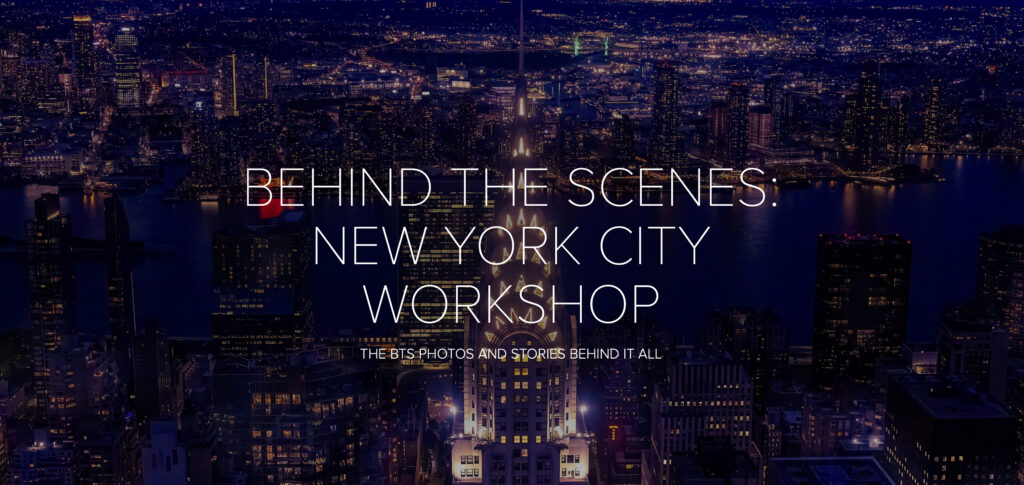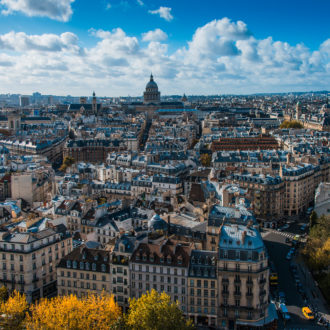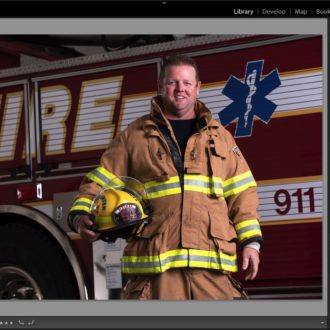Q&A On Photoshop’s New “AI-Powered Generative Fill” Feature and the End of the World As We Know It.

Programming note: I posted Behind The Scenes photos and the stories behind my New York City travel photography workshop, and instead of sharing my photos, I shared some of my participant’s images they made during the workshop (and they crushed it). If you ever wanted to see what these workshops are really like (and how hard we work), give it a quick look. Here’s the link. Now, onto the soul-crushing news of this new stuff:

Adobe turned the imaging world upside down with its release earlier this week of an incredible new AI-powered feature called “Generative Fill,” which lets you simply type what you want it to add to your photo (or create from scratch), and it not only does it, it does a pretty fantastic job. So now, if you can type a few words, you can create Photoshop magic.
When you add something to your image, it matches the lighting, applies the proper perspective, adds the appropriate shadows, and scales it appropriately. In most cases, even on the first try, the results are amazing. If you don’t like one of the three initial results, you can just hit “Generate,” and it gives you three more to choose from. It’s crazy! I knew something like this would be here one day, but I never thought it would be here this soon. I thought this was five to 10 years away, but it’s here now, and it’s fairly terrifying for many of us (like me).
People have lots and lots of questions about this new feature, so today, I thought I’d address at least a few of them. Here goes:
Q. How do I get this new feature? I download the new Photoshop update, and it’s not there.
A. It’s not in the latest version of Photoshop – you have to download a special Beta version of Photoshop (called Photoshop Beta) from the Creative Cloud App. Once you launch the app, click the “Home” button up top, and then in the list on the left side of the window, click on “Beta Apps,” and you’ll find the Photoshop Beta App. You can download it and run it without it interfering or messing with your existing copy of Photoshop (so yes, you will have two versions of Photoshop on your computer).
Q. I can’t get the “Generative Fill” button and type box to appear in that new floating Contextural Task Bar.
A. If you downloaded a Beta version earlier (to get the new Remove Tool before its official release), you’ll need to go to the Creative Cloud app and get the latest Beta version, which was just recently updated.
Q. Can I use these images in my commercial work?
A. Not yet. The program is still in Beta (it’s not a fully finished product, and Adobe is stressing it’s not to be used yet for commercial work). It’s available for you to test and give Adobe feedback on how the AI is working, but again – it’s Beta and not “ready for primetime” quite yet.
Q. How do we give Adobe feedback on how it’s working? How do I let them know if an image it created isn’t usable?
A. There’s a Thumbs Up/Thumbs Down a set of buttons in that floating contextural taskbar. If it did a great job, hit the thumbs up. If the result is trash, let ’em know by hitting the down button.
Q. What are the words I type in called? Is there an “Official Adobe Name” for those?
A. Yes, they are called “Prompts.”
Q. What if I want to type in something naughty or what some might call (ahem) “inappropriate?”
A. I knew you were going to go there. What’s wrong with you?
Q. I’m naughty and inappropriate.
A. That’s what I thought. Anyway, Adobe keeps you from doing that by using strict filters that block you from doing that kind of stuff. It will pop up a warning on the screen telling you it’s blocking that prompt, and it also uses your computer’s camera to take a photo of you, and it emails it to everyone in your Contacts app along with what you typed.
Q. Really?
A. No, but if it did, imagine what a deterrent that would be, right? The first part, the pop-up warning part, is for real, though. It’s very sensitive, so sometimes you’ll get that warning even when you feel like you weren’t doing anything that should be blocked like that.
Q. What do you recommend if I get that warning but wasn’t doing anything inappropriate?
A. Make a slightly different selection and try again. That will often do the trick.
Q. If you have it add an image to your image. Does it match the resolution of your image?
A. All of the edits it makes are a maximum of 1024×1024 at this point (remember, it’s Beta), so as long as you don’t select a large area, it works fine. If you do select a large area, it scales that 1024×1024 up to fill that area, so if you need to fill a large area, you’re better off doing it in small pieces rather than trying to fill a large area all at once, but I recommend trying it once, see how it looks, and if you don’t like, just trash that layer.
Q. So, if I have it create an object, let’s say a flock of birds in the sky, and they appear on their own layer, the background behind those birds is not transparent?
A. That is correct – it is not. It renders a square background behind those birds that perfectly match the environment you’re adding it to. At this point, there is no way to make that background behind the first transparent other than using Select Subject (or selecting them some other way) and putting them on their own separate transparent area.
Q. What if I generate something, like a single cloud in the sky, but I want to move it once it appears? It’s on its own layer – can I just drag it to a different location?
A. You can, but you won’t like the results. It renders a square area around the object you’re adding, and it blends into that particular area. If you move it, chances are it’s no longer going to be a clean match (probably not even close), so if you want your cloud (or whatever) to be in a different location, trash that layer, draw a new selection where you want that cloud, and Generate a new cloud.
Q. Is there a way to keep that old cloud? I really liked it.
A. At this point, unfortunately, no. Each cloud is rendered unique and pulled from an archive of about a bazillion clouds, so that exact cloud, which was rendered just for you, just for this image, will probably never happen again.
Q. Do I need a model release if I use a photo of a person it generated in my image?
A. I’m not a copyright attorney, and this is not legal advice, but it is my understanding that the person in your image does not exist. It is a composite of several different people, so you don’t need a model release for someone who doesn’t exist.
Q. Can I type a prompt for something specific, like “Blue Ford F-150 Truck on the highway?” Will that render a Ford F-150?
A. It doesn’t do brands, so while it will give you a truck, it won’t be a Ford F-150. It will build some sort of a composite made from several trucks, and they may not even be pickup trucks. So you’d have to say something like “Pickup Truck.”
Q. What if it makes a truck, but I wanted it to be larger in the scene? Do I type “Big pickup truck?”
A. It doesn’t do things like “big.” You’d just need to make a larger selection, and it will make a larger truck in that selected area.
Q. Do you know when this will be finished and released into regular Photoshop?
A. I do not. I’m not sure Adobe knows. They’ve put it out there in Beta to get your feedback and help the AI learn and grow. When it’s fully baked, I imagine that’s when it’ll be released in regular Photoshop, but the way AIs generally work, they get better and better over time – it keeps learning as it gets feedback from users, so even after it is finally released, it will continue to learn and get better.
Q. Which topics or objects are likely to look messed up when it generates them?
A. People’s faces are the most troublesome for it at this point. Sometimes they look really messed up, as they are a combination of multiple people’s faces, but then sometimes, they look amazingly real, but in my experience, it’s hit or miss with faces. Also, it has trouble with hands. Sometimes the fingers are in weird positions, or it adds more fingers and stuff like that. Also, sometimes animals (from dogs and cats to wild animals) can look weird from time to time.
Q What’s it do best?
A. It really nails landscape stuff, so if you ask for mountains or trees, a lake or a desert, or a sky, it shines on those and things you might realistically find in those environments.
Q. Will Adobe charge for using the final version of Generative Fill?
A. There’s no charge for using an unlimited amount of generations in the Beta version, but when the final thing is realized, I don’t know. As far as I know, Adobe hasn’t said anything about charging separately, but there are so many ways they could go with this, from being absolutely free as part of your existing subscription to a fee per use or a fee after a specific limit each month or a fee just for commercial use. Since it’s part of Photoshop, if I had to guess, I would think it will be part of your subscription, or maybe they’ll make a special subscription that includes this – I just don’t know.
Q. When I try it, it says that the server is busy right now and to try again later. What should I do?
A. You should try again later. I imagine right now, as the whole world is wrapping their heads around this, everybody is using this thing non-stop, just seeing what they will do and having fun watching their own jaws drop. So, I imagine as the days go by, things will calm down, and you’ll see fewer of those warnings.
Q. As a photographer, as you at all freaked out about this?
A. Yes, I am. I’m kind of freaked. I can see this is going to change my world as a photographer and the entire playing field, but I’m just sitting back at this point and see how this all shakes out.
Q. Is there a particular group of photographers that is more freaked out than others?
A. Yes, photographers who submit images to any stock photography outlets. They are freaking out. Those folks have a lot of questions for Adobe about how they are going to be compensated for the fact that Adobe is pulling these AI creations from the millions and millions of images submitted to Adobe Stock on the idea that they would be paid if somebody used them. I don’t know what Adobe’s compensation plan is for those users, and I don’t know if they have articulated what that is yet (I haven’t seen it, but it may already be out there), but I’m sure that info will be forthcoming. Whether those contributors embrace or reject their proposal remains to be seen, but that group is letting me know they are pretty freaked out (and that’s being kind).
Q. Is photography as we know it over? Should I sell my camera?
A. I’ve seen your photos. Yes, you should sell your camera.
Q. #Ouch! Really, I should sell my gear? That’s mean.
A. I know. It’s why I love doing these Q&As. But, actually, you should not sell your camera. I doubt you bought your camera to make a buck. I bet you bought it because you love photography. You love making images and documenting your life, travels, family, and your world – and this doesn’t change any of that.
Q. But how will we know if an image is real, or did AI add that rowboat, fisherman, seagull, or sun beaming through the clouds?
A. You don’t, but you didn’t before this. You could do all this stuff last month in Photoshop. You could add a rowboat to a scene, a fisherman, a seagull, or sun beaming through the clouds. We could always add these things to our images, and for the past 30+ years, people have been doing just that – creating composites and things and places that don’t really exist. They entered photo competitions and won with images where they “cheated” and composited things into their images that weren’t there. They sometimes have also been caught in the act and exposed. We’ve always been able to add stuff to our images that weren’t there or create aspects that didn’t exist – this just makes the process much faster and/or easier, but we’ve always been able to do this stuff if you had the skill, time and patience to make it happen.
Q. What about photography competitions? Where does this leave them?
A. Many, many photo competitions already allow composites; they just require you to disclose that your image is a composite (and most folks do, but some don’t or claim they didn’t know they were supposed to disclose that it was a composite). Competitions may require you to submit the original Raw image alongside your finished image, or if you shot in JPEG, you may have to submit to having your image sent through an authenticity verification site that. There are already Websites that can show if an image has been altered from its original state and exactly what was done to it. The game is changing, and the rules will be amended to keep up with them. You’ll probably even see entire photo competition categories just for generated images that don’t exist in real life and were created by your typing and AI rendering.
Q. So, is what you’re saying that I shouldn’t freak out about all this stuff?
A. No, you should totally freak out. I know I am.
I hope you found that helpful. If you have more questions, I’ll try to add them to this list, and if I need to update any of these Q&As based on new info, I’ll do it right away. Or I’ll just go to ChatGPT and have it update it. 😉
Have a great, totally freaked-out weekend, everybody!
-Scott


